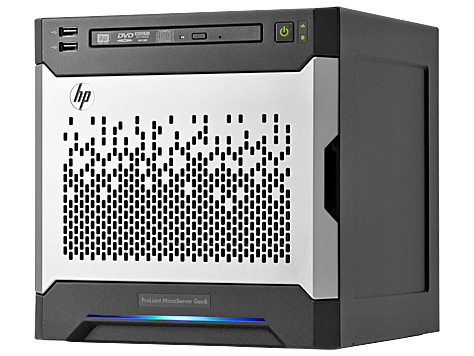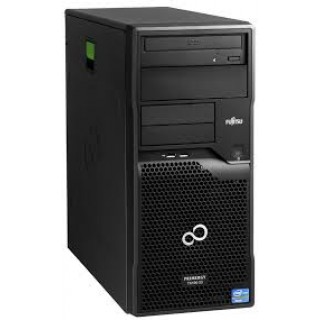A server can benefit any size of business.

The HP Microserver is ideal for the home office or micro-business

Fujitsu Primergy Servers are suitable for any small office.
If you don't have a Server, whether you're one person working alone with multiple devices (PC's, laptops, tablets and smart-phones) or have multiple users trying to work together, you'll find a Server is the missing link.
What is a Server?
A server is a computer that provides one or more services to other computers on a network. That network may be the Internet or a local area network in your office or even in your home.
We are interested here in office-based Servers which typically provide these services:
- Control the security of the network.
- Store company documents.
- Store and process email, contacts and calendars.
- Allow remote access to documents, email and other network resources through an Internet connection.
In short, an office Server will centralize your company’s data storage making it easier for you to control, share, access, secure and backup that data.
Sharing files - Without a server, files tend to be scattered between computers and are commonly shared by copying to a USB stick or being emailed. Sharing in this way can lead to multiple versions of the same document, and loss of control over those documents. Increasingly common is the use of Dropbox and other Cloud file synchronization services, but again you risk losing control of your data, the moment it leaves your server.
Backing up - Without a server, backing up everything of importance on each machine, becomes a chore and is often ignored. Backing up data from a Server is much easier because everything is in one place and the task can be automated.
Accessing data – users can access documents and emails from any machine on the network or even remotely through the Internet.
Security – User access to data is controlled by the Server. Groups of users can be defined and documents can be shared according to user or group privileges.
How is a Server Computer different from a Desktop PC?
- Servers are built from better quality components. For instance, the memory will have enhanced error checking to be sure that the data being worked on is less prone to corruption.
- It is common to have more than one hard drive with data being mirrored between them. If one drive fails, the system will carry on as normal, alleviating the stress of lost data and system down-time, and allowing the system administrator to replace the failed drive at their leisure.
- Servers don’t waste time or money with expensive high powered graphics and sound hardware because they will not be used.
- In a modern Server everything possible is done to make them power-efficient because, in order to be useful, they are left on 100% of the time.
- Servers use a different operating system than Desktops because they have a different function. See Below.
There are predominantly two different operating systems used on Servers around the world:
- Microsoft Windows Server
- Linux
Linux is more common on Internet Servers and super-computers.
Windows Server is more common on office-based servers which serve Windows Desktop PCs in a local area network.
Putting a Microsoft Windows Server in control of a network of Microsoft Windows Desktops is a very obvious choice to make and that, no doubt, accounts for the predominance of Windows Servers over Linux Servers in the office.
However, Linux is not only a valid alternative to the Windows Server Operating System; there are a number of factors that might make it preferable.
- Linux is renowned for security, stability and scalability.
- Linux cannot be infected with Windows viruses.
- Linux is Open Source and available at no cost.
- Linux is more efficient than Windows so demands less powerful and therefore less expensive hardware.
Just to be clear, Linux can talk to Windows computers as though it were a Windows Server. Windows PCs will not be aware or concerned that they are communicating with a Linux Server and neither will your Windows network users.
And because of the immediate saving on license fees associated with Linux and the fact that you don’t need a powerful Server just to boot it up, it isn’t unreasonable to suggest that a small business installing their first Server could spend a thousand pounds less by choosing Linux over a Windows Server and still achieve all they need.
Do you need a Server?
The preceding description should demonstrate that sharing data between users and accessing data from multiple devices (PCs, laptops, tablets, smart phones) is one of the prime advantages of storing data centrally.
If there is more than one person in your business, the data sharing aspect is itself, a winning argument.
Even if you are one person working alone, you may still have multiple computers and devices that could all work better together with a Server at the centre of your network.
The fact that a Server can be built with greater resilience and incorporate an automated backup solution makes it an even more sensible solution for any business.
If you have any questions about Server solutions, please call Clover Consultancy on 01823 336220.
Every business is different, so we tailor solutions around you to fit your needs and budget.
Articles
Control your Data
Do you want the advantages of the Cloud without putting your data on someone else's server?
Windows XP
Do you still use Windows XP and if so, what are your options?
Servers
No matter how big or small your network, a Server can make your life easier.
History of Open Source
The term Open Source is gradually seeping into the public consciousness, but what's it all about?
Linux
Linux is the world's most important operating system
Dalek
The Dalek Project
